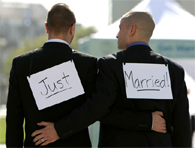We have been through three phases.
(1) Pre-2001. Same-sex relationships slowly got recognised, on an issue by issue basis, in some western countries. Benefits under health insurance and pension schemes and successor rights to rent controlled apartments got extended to same-sex partners. This was followed by recognition through registration systems – done first by Denmark in 1989. ‘Registered partnerships’ or ‘civil unions’ became a ‘non-marriage’ kind of marriage. Registration became increasingly popular with politicians in the West, for it avoided the loaded word ‘marriage.’ Some systems gave all the benefits of ‘marriage’ – others gave only some.

(3) 2011 and on. The tide has clearly turned. We have tipped over a tipping point. Andrew Sullivan, the conservative Anglo-American writer and columnist, long ago pointed out that marriage was a conservative issue. We were seeking part of the existing heterosexual package of legal privilege and moral approval.
If conservatives condemned gay promiscuity, that was a reason to legalise marriage (though heterosexual unions were increasingly unstable – perhaps, actually, not the best model to follow). Sullivan, to the horror of many more radical gay leaders, had seen the future.
In October, 2011, British Prime Minister David Cameron announced his support for opening marriage:
“Conservatives believe in the ties that bind us; that society is stronger when we make vows to each other and support each other. So I don’t support gay marriage despite being a Conservative. I support gay marriage because I’m a Conservative.”
The British government has just gone through a three month public consultation on opening marriage. We may see legislation later in the year.
In May Francois Hollande was elected President of France. In his campaign he pledged to open marriage, continuing the policy of his predecessor as Socialist party leader, Segolene Royal. He and Royal had been in a long-term relationship, with children, but had never married. They separated shortly after Royal was defeated in the previous presidential election. Hollande is in a newer relationship, again unmarried. So French.
And, of course, Barrack Obama came on board in May – better late than never. In a carefully staged interview he (a) affirmed that he and his wife are both “practicing Christians”, (b) that he had discussed the issue with his wife and his two daughters – the daughters conveniently had school mates with same-sex parents, (c) that on his staff were gays and lesbians, in committed relationships, who were raising children, and (d) reminded listeners that gays could now serve openly in the armed forces. He had concluded that such dedicated family types should be able to take on the legal commitments of marriage.
The Obama administration no longer supports the federal Defense of Marriage Act, popularly known as DOMA. In any litigation government lawyers will tell judges that the administration considers that DOMA is unconstitutional. Otherwise Obama does not have to deliver anything. Marriage is a matter for the individual states, not the federal government. Progress, from now on, is up to state governments and the courts.
Three of the five permanent members of the United Nations Security Council now have heads of government that support opening marriage – the United Kingdom, France and the United States. The other two, China and Russia, may take a while longer to come on board.
Another new development was the North Atlantic Treaty Organization meeting in Chicago this spring. For the first time there were two heads of government who were openly gay or lesbian – Elio Di Rupo from Belgium and Johanna Sigurdardottir from Iceland.
In June, 2012, Denmark, which had pioneered ‘registered partnerships’ in 1989, moved on to full marriage. The 1989 legislation was a world-changing event. Now it was oddly old-fashioned and a ‘separate but equal’ arrangement at best. Those already in registered partnerships can continue that arrangement, or convert to marriage. No new registered partnerships will be possible.
And Asia? The first places where marriage may be possible are Taiwan and Nepal. No time frame yet for either one.
Doug Sanders is a retired Canadian law professor, living in Bangkok. He can be contacted at sanders_gwb@yahoo.ca











 Printable Version
Printable Version
















Reader's Comments
But it's a nice,though brief, outline of events.
Asia is so far behind for getting married compared with some Western countries.
it just needs one Asian country to allow it then the rest might follow i hope!
But let's also not forget that marriage may change the nature of a relationship, turn it sour and lead to divorce. Almost half of straight marriages end up in divorces: for the US, see
http://divorcerate2011.com/divorce-statistics
and we also see this happening now for new gay couples. No need to describe the agony of divorce, the legal mess, consequences for children...
Personally, that's why I don't believe in marriage, gay or straight. (Committed union is different.) In spite of this, I support the right to gay marriage from a political viewpoint, and of course everybody has his or her own sensitivities on the questions. But let's not forget the pitfalls of marriage.
Two things I don't like about it are:
Churches use it as a platform to preach their hatred of gay people. An us against them position.
Neo-conservatives say that children can only be healthy with a father and a mother. They allow for no other model. Yet these same nasty people send countless fathers off to wars just and unjust, often never to return to their children. What about these children without two parents of opposite gender?
Please log in to use this feature.